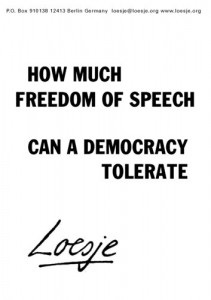Freedom of expression

Being able to voice one’s opinion – especially if one is able to analyse information and to frame one’s opinion in logic – is an essential contribution to social movements of all sizes. We hear about lack of freedom of speech and think we know what it looks like; Amnesty International frequently records and circulates case stories of people imprisoned or killed for expressing something about themselves. But in the countries in which speech is said to be free, it may not be. There is of course acceptable speech – whether due to social norms from moral values to courtesy. But the fundamental requirement of a democracy is people who are able to analyze and frame conclusions, as nicely represented by a sign at Occupy Portland: ‘Teach me how to think, not what to think”.
Recently, a panel of volunteer educators from Occupy Portland was invited to leave a classroom when they started raising topics of US wars and house foreclosures with 13 and 14-year-old pupils. Teachers object in an open letter, asking, ”Is it school district policy that only individuals who are engaged in social justice activism are so profoundly controversial and threatening that their presence in schools requires parental permission?” They also point out biases in the textbooks approved and used by the school, citing the economics textbook as teaching that “income inequality is caused by differences in household sizes, that the best predictor of poverty is whether family members are employed, that welfare tends to create cycles of poverty, and that military spending has been decreasing while “income redistribution” has vastly increased.” In 2009, over a fifth of Portland children were living in poverty (data from city-data.com).
Freedom of expression is only really valuable if one is expressing thoughts that have had time to deepen and be examined from different sides. I would have said I was always for freedom of expression, until I was recently subjected to shouted insults and invective by a stranger after I asked him to pause and wait just two seconds on a forest path instead of walking into the shot my camera was recording. The most interesting aspect of the torrent of abuse which this man freely expressed at me, until I packed up and walked away from him, was that his insults hinged on my selfishness in asking him to pause briefly. It is indeed true, as he claimed, that I could take another picture to replace the one ruined by his walking right into the shot. However, that a request for consideration should incite such a response, and that shouting insults at a stranger is an acceptable form of speech, is an interesting take on individual freedom and free speech. It was clearly discourteous, to say the least, but what fascinates me is that anyone would feel unhampered by social mores to loudly and repeatedly shout insults at a stranger in the middle of a park, without any concern even for the other people in the park.
The promotion of the individual, and of individual achievement, has resulted in this ability to negate any empathy for others and to pay attention only the emotions of the moment. This selfishness is also obvious on the road, where drivers often do not move over to give room to cars entering, sometimes forcing them onto the shoulder.
Shaking one’s head at these anti-social people, or calling the park shouter mentally unstable, is facile, but it does not address the question of how to develop a more pro-social society. The easiest communication is that between people who share similar values. Another easy form is the faux intimacy created by the rapid sharing of personal details in this culture. This rapid sharing is most often one-way, which is one reason it appears to be a form of communication which flows without obstacles. But argument to persuade another is harder. One reason is it touches emotions and resistance but eschews the simple pleasure of glorying in emotion. This last is the enjoyment for both the person who tells intimacies to strangers and the man who shouted insults at someone who asked him to pause briefly to avoid ruining a photograph. Discussion seeking logic and evidence uses a different part of the brain, the logical center, and this is harder to exercise. In addition, many ‘facts’ are actually either opinion or theory: a prime example is economic theory. However, the current major problems facing the world will not be solved by telling life stories alone, and certainly not by shouting insults at strangers. The only way forward is through using reason and recognizing emotions and opinion wherever they are, disguised as fact or not.
[See also my related page ‘Thinking about Occupy’.]



Leave a Reply